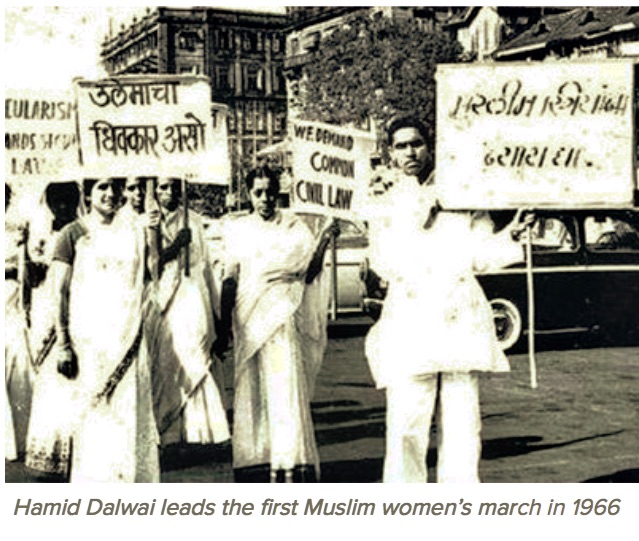Hamid Dalwai
This is a collection of articles archived for the excellence of their content. |
Contributions
Initiated movement against triple talaq
Radheshyam Jadhav, January 1, 2018: The Times of India

From: Radheshyam Jadhav, January 1, 2018: The Times of India
Hamid Dalwai: Man who started triple talaq movement died alone
While BJP celebrates the passage of the Muslim Women (Protection of Rights on Marriage Bill, 2017) in the Lok Sabha and claims credit for it, not many may be aware of the struggle of Muslim reformist Hamid Dalwai, who first raised the demand to scrap triple talaq.
Interestingly, when Dalwai proactively initiated a Muslim reform movement, the BJP was not even in the picture and its earlier political avatar, the Jan Sangh, had not even thought of any such move. The Congress was wary of undoing archaic community laws when Dalwai stirred social circles by demanding the scrapping of all forms of talaq and polygamy in the 1960s. Marriage and divorce must be governed by constitutional provisions, he insisted.
An ardent atheist and rationalist, Dalwai faced opposition from all quarters during his lifetime. Without any backing from political parties and organisations, he organised the first march of Muslim women in Mumbai demanding equal rights and scrapping of the talaq system. Despite considerable effort, he could get together a mere seven Muslim women to participate in the march organised on April 18, 1966, but it was a first step. "That was the beginning of the Muslim reform movement. Women submitted a memorandum to then chief minister of Maharashtra Vasantrao Naik demanding justice for Muslim women, ban on polygamy and execution of a common civil code. A copy of the demand was sent to the central government," recalls current Muslim Satyashodhak Mandal president Shamsuddin Tamboli.
Born at Mirjoli in the Konkan area of Maharashtra on September 29, 1932, Dalwai got connected with the Rashtra Seva Dal, a wing of the Socialist Party and came close to socialist veterans like Bhai Vaidya. Influenced by Ram Manohar Lohia, Jaiprakash Narayan and Mahatma Gandhi, Dalwai started writing about the need for reform among Muslims. Realising that writing alone would not suffice, he established the Indian Secular Society along with A B Shah in 1968 and went on to form the Muslim Satyashodhak Mandal in Pune on March 22, 1970. The idea of the Mandal came from the Satyashodhak Samaj — truth-seeking society — formed by 19th century social revolutionary Mahatma Jotirao Phule.
"Raising the demand to scrap triple talaq, polygamy and halala was a revolutionary step at that time. Nobody came in his support and we were a few people fighting for the cause. It was an isolated battle all these years till political parties recently jumped into the action with political motives," says 83-year-old Sayed Mehboob Shah Qadri alias Sayedbhai, who recalls his long association with Dalwai and his movement. Qadri joined Dalwai when his sister was given talaq at the age of 18. He describes how Dalwai faced physical attacks, threats, social boycott and isolation during his lifetime.
Dalwai and his wife Mehrunnisa were ostracised by the community and dubbed as 'enemies' of the religion as they organised meetings, conferences and agitations demanding that Muslim women not be discriminated against in the name of religious law.
Octogenarian socialist leader Bhai Vaidya who facilitated Dalwai's movement says that, unlike today, there was no political motive to Dalwai's reform movement. Vaidya says Dalwai believed in the Constitution and secularism. His movement was aimed at reforms, not politics. In fact, when the R-S-S tried to make common cause with him, he gave a scathing reply saying that those who intend to make Muslims second-class citizens and treat them as an internal threat to India can never empathise with the community.
Vaidya told TOI, "The R-S-S was always supportive of personal law and M S Golwalkar insisted on personal laws for Hindus. The R-S-S never talkedof Muslim reforms as their official stand was that Muslims are enemies of the nation. Hamid Dalwai criticised the R-S-S for its stand and it tried to thwart one of his meetings in Nagpur as Dalwai was insisting that the majority in the country must be secular and not religious."
In the euphoria of passing the current bill, some rightwing organisations and individuals are coming forward to join hands with the Mandal, says Tamboli, adding, "We have received such invitations earlier. But joining anyone who believes in building a nation based on religion is out of the question. Our movement continues as our demands are not yet met. We recently met Prime Minister Narendra Modi and insisted that scrapping triple talaq is not enough. The government must also act against other forms of talaq and end the inhuman practice of halala."
When Dalwai died of kidney ailment at the age of 44 in 1977, his death was celebrated by fundamentalists and meetings to pay him tributes were disrupted. As per Dalwai's will, his body was cremated and not buried despite opposition from the community.
Dalwai had emphasised that banning triple talaq without banning polygamy may intensify the problems of Muslim women.
Today, amidst the political blame game and celebrations, Dalwai supporters, though small in number, feel they still have a long, lonely battle to fight like their leader.